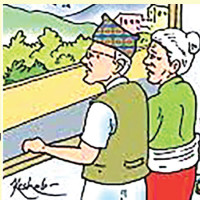- Tuesday, 3 March 2026
Open Space For Quality Of Life
Open green spaces play a vital role in enhancing the quality of our lives and the environment. They offer habitat for a diverse range of plant and animal species, leading to an increase in biodiversity. These green spaces also work wonders for the urban climate by reducing air temperature and removing air toxins, which ultimately helps to reduce pollution levels. Moreover, these areas have a significant impact on our mental health by providing us with the psychological benefits of being exposed to nature. Additionally, these green spaces promote physical exercise, which is essential for our overall health and well-being.
However, the open green spaces in Kathmandu are gradually disappearing, and the remaining areas are being encroached upon from all sides. The few green spaces that are still available are either closed to the public due to safety and privacy concerns or collapsing due to a lack of proper management and development of infrastructure. This situation is a result of the traditional concept of development that equates to the construction of buildings, which has a direct impact on the availability of open spaces.
The lack of public open spaces is making Kathmandu an unhealthy place to live. The lack of green spaces has created a psychological effect on urban residents, as open spaces act as stress relievers from the monotonous city life. With an increasing urban population, the depletion of resources, the decrease in groundwater availability, and the adverse effects on the city's climate, it is more essential than ever to provide public open spaces. Green open spaces not only enhance the physical and social inclusion of children and young people by providing them with a recreational space but also foster social connections and community engagement. It helps to foster a sense of belonging by promoting cultural and civic identity, which in turn enhances social cohesion. Moreover, open green spaces in cities serve as a significant economic asset for tourism, leisure, and cultural activities, raising property values and aiding in urban regeneration. Public spaces are crucial assets in our cities as they contribute to safety, health, and a positive cultural environment.
To address the issue of shrinking open green spaces in Kathmandu, it is necessary to implement policies that prioritise the conservation and expansion of these areas. This can be achieved through the creation of protected green belts, green infrastructure, community gardens, and parks. In addition, the city must explore innovative solutions such as vertical gardens and green bridges to maximise the use of limited space.
It is also crucial to involve the public in the planning and management of open green spaces. Community engagement can help ensure that the needs and preferences of local residents are taken into account and that the spaces remain inclusive, accessible, and safe for all. Encouraging public participation in the maintenance and upkeep of these areas can also foster a sense of ownership and responsibility, contributing to their long-term sustainability.
In conclusion, open green spaces are essential for the health and well-being of humans and the environment. It is crucial to recognise their importance and take action to protect and expand them in our cities. By doing so, we can create livable, safe, and sustainable communities for everyone.
(The author is a biomedical engineer.)









-original-thumb.jpg)







